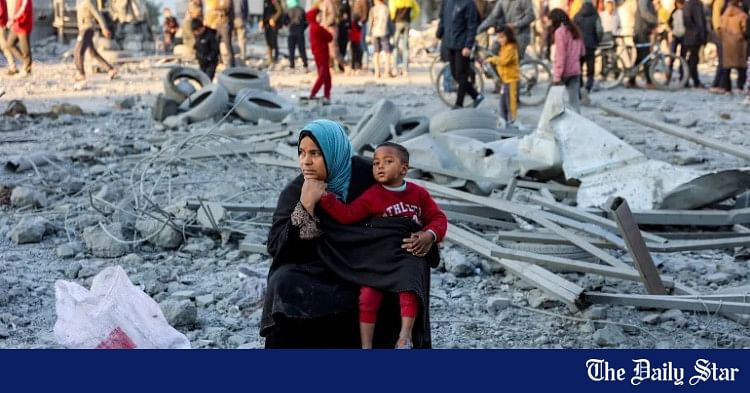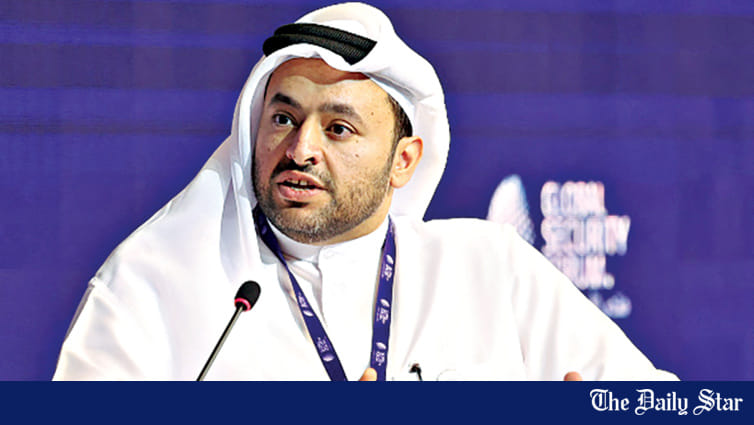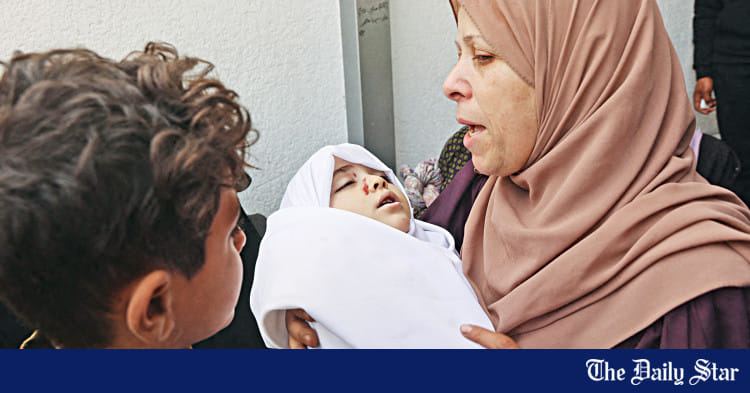Saif
Senior Member
- Joined
- Jan 24, 2024
- Messages
- 17,300
- Likes
- 8,334
- Nation

- Residence

- Axis Group


Palestine’s plight: A global failure of justice and humanity
The world must act to stop the cycle of violence.
Palestine’s plight: A global failure of justice and humanity

The international community can no longer ignore the atrocities occurring in Palestine. FILE PHOTO: AFP
The atrocities endured by Palestinians at the hands of Israeli forces have reached alarming proportions, culminating in a global humanitarian crisis that demands urgent international attention. The central questions are: how can the world put an end to these atrocities, and why do Israel's actions persist with the backing of the US and many Western countries? Why does the UN, tasked with upholding human rights, remain so ineffective in safeguarding innocent lives?
The Geneva Conventions of 1949 and their Additional Protocols (1977) form the cornerstone of international humanitarian law, specifically designed to protect civilians during armed conflict, including those in occupied territories. In light of these conventions, the actions of the Israeli government could be classified as "state terrorism."
It is shameful that the UN, despite its mandate to protect human rights, has failed to act decisively. Even more troubling is the hypocrisy of Western countries that proclaim democratic values and human rights, yet continue to support Israel despite its repeated violations of international law. For over half a century, Muslim-majority countries have offered little more than rhetorical condemnation—remaining divided and failing to take substantive action against Israel's crimes against humanity.
The role of the US and Western countries
The support of the US and other Western nations is key to understanding why Israel has not been held accountable. Despite recurring human rights violations, Israel has been shielded from international scrutiny and sanctions, particularly within the UN. The US, a long-standing ally of Israel, frequently exercises its veto power to block resolutions that could impose pressure or sanctions. This protection has enabled Israel to operate with impunity, while the suffering of the Palestinian people continues to be neglected.
Western media coverage is often skewed, failing to adequately highlight the plight of Palestinians or to critically examine Israel's actions—thereby perpetuating a one-sided narrative.
The need for reform in the UNSC
The UN Security Council (UNSC), designed to maintain global peace and security, has failed to effectively address the Palestinian issue. Its paralysis, primarily due to the veto power held by its five permanent members, including the US, renders it unable to take meaningful action. For Palestinians, this means justice is continually deferred, and their suffering prolonged.
The ongoing crisis in Palestine exposes the UNSC's failure to protect human life. If the council is to remain relevant, it must undergo significant reform. The current veto system should either be restructured or abolished, and economic sanctions should be imposed on violators of international law through majority votes among UN member states.
Another reform proposal involves selecting UNSC members based on their contributions to global peace, rather than their nuclear capabilities. A more inclusive and representative structure could foster a fairer and more just approach to international issues. Some advocate for proportional representation based on population or religious affiliation, arguing that this could help prevent conflicts driven by religious divides.
Would the world remain silent if Palestinians were Christians instead of Muslims? Some may argue not.
Despite Muslims comprising the world's second-largest religious group and the existence of 57 Muslim-majority countries, there is currently no Muslim representation on the UNSC. This glaring omission highlights the urgency for Muslim states to take a more active role in pushing for UNSC reform. With Muslim representation, the plight of Palestinians—and other oppressed Muslim communities—might have received more meaningful international attention.
The political fragmentation of the Arab world
Without reform of the UNSC, what alternatives remain? One potential solution is the strengthening of regional coalitions, such as the Organization of Islamic Cooperation (OIC), to apply greater diplomatic pressure on Israel and its allies. While the OIC's track record on Palestine has been limited, it represents a significant bloc that could unite to demand international sanctions against Israel.
On April 12, 2025, millions in Bangladesh took part in the March for Gaza, where one of the key demands was for OIC member states to sever diplomatic ties with Israel and impose trade embargoes on it and its supporters. Despite wielding considerable economic leverage through oil, many Muslim-majority countries, such as Saudi Arabia, have not used these resources strategically.
An oil embargo could severely disrupt the economies of countries that support Israel, potentially impeding weapons manufacturing and imposing other costs. While such a measure might be seen as a last resort, the question remains: do Muslim leaders possess the courage, strategic vision, and unity needed to impose such sanctions and to gain support from influential nations in Europe, Asia, Africa, and Latin America?
Long-standing rivalries within the Muslim world, such as the tensions between Saudi Arabia and Iran, have hindered unified action. Overcoming these divisions is crucial if a coordinated response to Israel's actions is to be achieved.
As the Prophet Muhammad (pbuh) said, "The entire Muslim community is like one body. If one part of it feels pain, the whole body feels the pain." If the Ummah truly believes in this, it must take decisive action to end the violence and support Palestinian independence.
Western hypocrisy and the 'self-defence' narrative
For too long, Western nations have prioritised geopolitical interests over human lives in the Israel-Palestine conflict. They are quick to condemn human rights abuses elsewhere, yet remain silent or supportive when it comes to Israel. The widely accepted narrative of "self-defence" masks the reality: this is not defence, but occupation, displacement, and the forced refugee status of Palestinians within their own land.
The power of public opinion
The international community can no longer ignore the atrocities occurring in Palestine. Global public opinion, especially through grassroots movements, has the power to influence policy. Protests, social media campaigns, and petitions can place pressure on governments to reconsider their support for Israel. In extreme cases, citizens may feel compelled to hold their own governments accountable if they continue to endorse actions viewed as crimes against humanity.
While humanitarian aid is crucial, it must not be seen as a substitute for political advocacy. It should instead work alongside efforts to pursue justice for Palestinian victims of aggression.
A global moral responsibility
The struggle for Palestinian rights is not merely a regional issue, it is a global moral imperative. The time to act is now, before yet another generation is lost to conflict and suffering. Continued inaction represents a failure of leadership, of humanity, and of justice.
Nations, particularly those with global influence, must demand accountability, support Palestinian self-determination, and work towards a just and lasting peace. There can be no lasting peace in the Middle East without an independent, sovereign Palestine. The world must act to stop this cycle of violence.
Dr M Jashim Uddin is director at the Center for Peace Studies (CPS) at North South University.
The international community can no longer ignore the atrocities occurring in Palestine. FILE PHOTO: AFP
The atrocities endured by Palestinians at the hands of Israeli forces have reached alarming proportions, culminating in a global humanitarian crisis that demands urgent international attention. The central questions are: how can the world put an end to these atrocities, and why do Israel's actions persist with the backing of the US and many Western countries? Why does the UN, tasked with upholding human rights, remain so ineffective in safeguarding innocent lives?
The Geneva Conventions of 1949 and their Additional Protocols (1977) form the cornerstone of international humanitarian law, specifically designed to protect civilians during armed conflict, including those in occupied territories. In light of these conventions, the actions of the Israeli government could be classified as "state terrorism."
It is shameful that the UN, despite its mandate to protect human rights, has failed to act decisively. Even more troubling is the hypocrisy of Western countries that proclaim democratic values and human rights, yet continue to support Israel despite its repeated violations of international law. For over half a century, Muslim-majority countries have offered little more than rhetorical condemnation—remaining divided and failing to take substantive action against Israel's crimes against humanity.
The role of the US and Western countries
The support of the US and other Western nations is key to understanding why Israel has not been held accountable. Despite recurring human rights violations, Israel has been shielded from international scrutiny and sanctions, particularly within the UN. The US, a long-standing ally of Israel, frequently exercises its veto power to block resolutions that could impose pressure or sanctions. This protection has enabled Israel to operate with impunity, while the suffering of the Palestinian people continues to be neglected.
Western media coverage is often skewed, failing to adequately highlight the plight of Palestinians or to critically examine Israel's actions—thereby perpetuating a one-sided narrative.
The need for reform in the UNSC
The UN Security Council (UNSC), designed to maintain global peace and security, has failed to effectively address the Palestinian issue. Its paralysis, primarily due to the veto power held by its five permanent members, including the US, renders it unable to take meaningful action. For Palestinians, this means justice is continually deferred, and their suffering prolonged.
The ongoing crisis in Palestine exposes the UNSC's failure to protect human life. If the council is to remain relevant, it must undergo significant reform. The current veto system should either be restructured or abolished, and economic sanctions should be imposed on violators of international law through majority votes among UN member states.
Another reform proposal involves selecting UNSC members based on their contributions to global peace, rather than their nuclear capabilities. A more inclusive and representative structure could foster a fairer and more just approach to international issues. Some advocate for proportional representation based on population or religious affiliation, arguing that this could help prevent conflicts driven by religious divides.
Would the world remain silent if Palestinians were Christians instead of Muslims? Some may argue not.
Despite Muslims comprising the world's second-largest religious group and the existence of 57 Muslim-majority countries, there is currently no Muslim representation on the UNSC. This glaring omission highlights the urgency for Muslim states to take a more active role in pushing for UNSC reform. With Muslim representation, the plight of Palestinians—and other oppressed Muslim communities—might have received more meaningful international attention.
The political fragmentation of the Arab world
Without reform of the UNSC, what alternatives remain? One potential solution is the strengthening of regional coalitions, such as the Organization of Islamic Cooperation (OIC), to apply greater diplomatic pressure on Israel and its allies. While the OIC's track record on Palestine has been limited, it represents a significant bloc that could unite to demand international sanctions against Israel.
On April 12, 2025, millions in Bangladesh took part in the March for Gaza, where one of the key demands was for OIC member states to sever diplomatic ties with Israel and impose trade embargoes on it and its supporters. Despite wielding considerable economic leverage through oil, many Muslim-majority countries, such as Saudi Arabia, have not used these resources strategically.
An oil embargo could severely disrupt the economies of countries that support Israel, potentially impeding weapons manufacturing and imposing other costs. While such a measure might be seen as a last resort, the question remains: do Muslim leaders possess the courage, strategic vision, and unity needed to impose such sanctions and to gain support from influential nations in Europe, Asia, Africa, and Latin America?
Long-standing rivalries within the Muslim world, such as the tensions between Saudi Arabia and Iran, have hindered unified action. Overcoming these divisions is crucial if a coordinated response to Israel's actions is to be achieved.
As the Prophet Muhammad (pbuh) said, "The entire Muslim community is like one body. If one part of it feels pain, the whole body feels the pain." If the Ummah truly believes in this, it must take decisive action to end the violence and support Palestinian independence.
Western hypocrisy and the 'self-defence' narrative
For too long, Western nations have prioritised geopolitical interests over human lives in the Israel-Palestine conflict. They are quick to condemn human rights abuses elsewhere, yet remain silent or supportive when it comes to Israel. The widely accepted narrative of "self-defence" masks the reality: this is not defence, but occupation, displacement, and the forced refugee status of Palestinians within their own land.
The power of public opinion
The international community can no longer ignore the atrocities occurring in Palestine. Global public opinion, especially through grassroots movements, has the power to influence policy. Protests, social media campaigns, and petitions can place pressure on governments to reconsider their support for Israel. In extreme cases, citizens may feel compelled to hold their own governments accountable if they continue to endorse actions viewed as crimes against humanity.
While humanitarian aid is crucial, it must not be seen as a substitute for political advocacy. It should instead work alongside efforts to pursue justice for Palestinian victims of aggression.
A global moral responsibility
The struggle for Palestinian rights is not merely a regional issue, it is a global moral imperative. The time to act is now, before yet another generation is lost to conflict and suffering. Continued inaction represents a failure of leadership, of humanity, and of justice.
Nations, particularly those with global influence, must demand accountability, support Palestinian self-determination, and work towards a just and lasting peace. There can be no lasting peace in the Middle East without an independent, sovereign Palestine. The world must act to stop this cycle of violence.
Dr M Jashim Uddin is director at the Center for Peace Studies (CPS) at North South University.









































